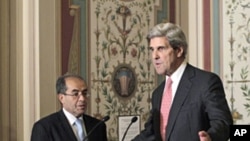The general secretary of Libya’s opposition National Transitional Council (NTC) says his group is satisfied and encouraged by the support it is enjoying from the Obama administration.
The comments by NTC official Abdul Karim came after a delegation from the group recently held talks with U.S. National Security Adviser Tom Donilon and other senior US officials in Washington.
Karim said his group received a warm reception from senior officials of the Obama administration.
“We are satisfied with U.S. support of our movement to build a new democratic Libya in the Mediterranean, which will be part and useful to the international community,” said Karim.
Council head and leader of the delegation, Mustafa Abdul-Jalil, said the group is seeking political recognition.
Karim said the opposition group feels energized by the Obama administration’s backing.
“To start from a huge influence from a super power like [the] USA, it is a big success [for us],” said Karim.
He also said the NTC is seeking more international recognition in its effort to force Moammar Gadhafi to step down and cede power.
Following last week’s meeting, U.S. National Security Adviser Donilon called the Libyan Transitional National Council a “legitimate and credible interlocutor of the Libyan people.” He said Gadhafi on the other hand, has “lost his legitimacy to rule.”
The US has promised $25 million in non-lethal aid for the opposition.
Karim said the NTC needs more financial support to help his group to protect unarmed civilians.
“We are looking for the support of the USA and all members of the [permanent] Security Council to find a way at least to release [those frozen] assets [of the Libyan government," he said. With such resources, he added, “we can save more lives and we can save our country.”
US Secretary of State Hillary Clinton has stated that the United States is trying to access more than $30 billion of the frozen assets for the rebels. The Contact Group on Libya also favors setting up an internationally monitored fund to help anti-Gadhafi forces provide basic services to civilians.
Meanwhile, the head of Britain's armed forces is urging NATO to broaden its range of bombing targets in Libya amid fears the conflict might end in a stalemate.
General David Richards told The Sunday Telegraph newspaper that there is a risk the conflict could result in Libyan leader Moammar Gadhafi clinging to power if NATO does not “up the ante.”




